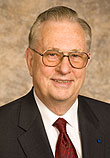Remarks

Dr. Arden L. Bement, Jr.
Director
National Science Foundation
Biography
Welcome Remarks
NSF Polymer Workshop:
Interdisciplinary, Globally Leading Polymer Science and Engineering
Arlington, VA
August 15, 2007
Good morning everyone. I am pleased to welcome you all to the National Science Foundation's Workshop on Polymers. I want to thank our many co-sponsors, who have helped to make this meeting possible.
I'm always delighted to speak at workshops because the participants, such as yourselves, play a vital role in helping NSF identify new frontiers. So thank you for undertaking this important work.
This is a major workshop aimed at exploring the status and opportunities across the polymer field with special emphasis on the nations international competitiveness.
I suspect many of you know that early polymer pioneer and Nobel laureate, Herman Staudinger, wrote in his memoirs that as late as 1930, the chemical establishment denied the existence of polymers. Polymers were perceived as simply dirty, impure colloids. And those working in the field, Staudinger wrote, were contemptuously called "grease chemists."
It is amazing to think of how far we've come in the intervening decades. Those "dirty, impure colloids" are now indispensable in household items and construction, in electronics and communications, in biomedicine and pharmaceutics, and countless other applications!
Indeed, polymer research has spawned world-class applications, some of which have produced entirely new concepts needed to fuel the engines of innovation. These include injectable polymers to repair bone defects and severe spinal cord injuries; methods to produce biodegradable plastic products; and plastic electronics, such as electronic books. Perhaps the most revolutionary application to date is the new Boeing 787 jet, built mostly of plastic composites. This could possibly remold the airline industry.
Undoubtedly, the field of polymer science and engineering has become a vibrant economic engine for the U.S. economy. I don't need to tell you that other promising applications are just around the corner. I do need you to help NSF follow the most productive path.
The Foundation has funded a number of the creative ideas that were fostered by polymer researchers. And equally as important to the advances in polymer research, is providing the next generation of superbly trained scientists and engineers to propel this enterprise in the coming decades. Since polymers form a natural umbrella to bring together the biological, physical, and engineering sciences, it is clear that future polymer researchers must be trained to work across disciplines.
Ironically, considering how central polymers are to our lives, they are rarely taught in undergraduate education. We still see them taught as specialized courses. So, one of the major challenges ahead is how to incorporate the study of polymers into the undergraduate curriculum. Universities have now taken up the challenge and are focusing on ways to integrate polymer courses and disciplines. And I'm pleased that it will be an area of focus for this workshop as well.
The continued excellence of our science and engineering enterprise not only depends on a cadre of workers trained to work across disciplines, but also to work across geographic borders.
We're in a new era, where competitive pressures have intensified. In many respects the circulation of brain power around the world, is just as critical as the circulation of goods and services. We must be much more engaged on a global scale if we are going to stay in the game. That means, as a nation, we must confront the challenge of global competition by becoming both a high-stakes competitor and a valued collaborator.
The National Science Foundation is determined to keep the U.S. science and engineering enterprise apace with these challenges. We are a lead agency in implementing the American Competitiveness Initiative, which lays out concrete steps for strengthening the nation's competitive base, while increasing our collaborative advantage.
NSF's role is to build a comprehensive research base that undergirds the nation's innovation output, and to lead the reforms in U.S. science and engineering education needed to meet the demands of the global workplace.
Workshops such as these keep us in constant dialogue with you, the science and engineering community, to build a research scenario that is most likely to keep America a global leader.
I hope that this workshop will provide new insights on how we should proceed along this new path. The NSF is eager to receive your workshop proceedings.
